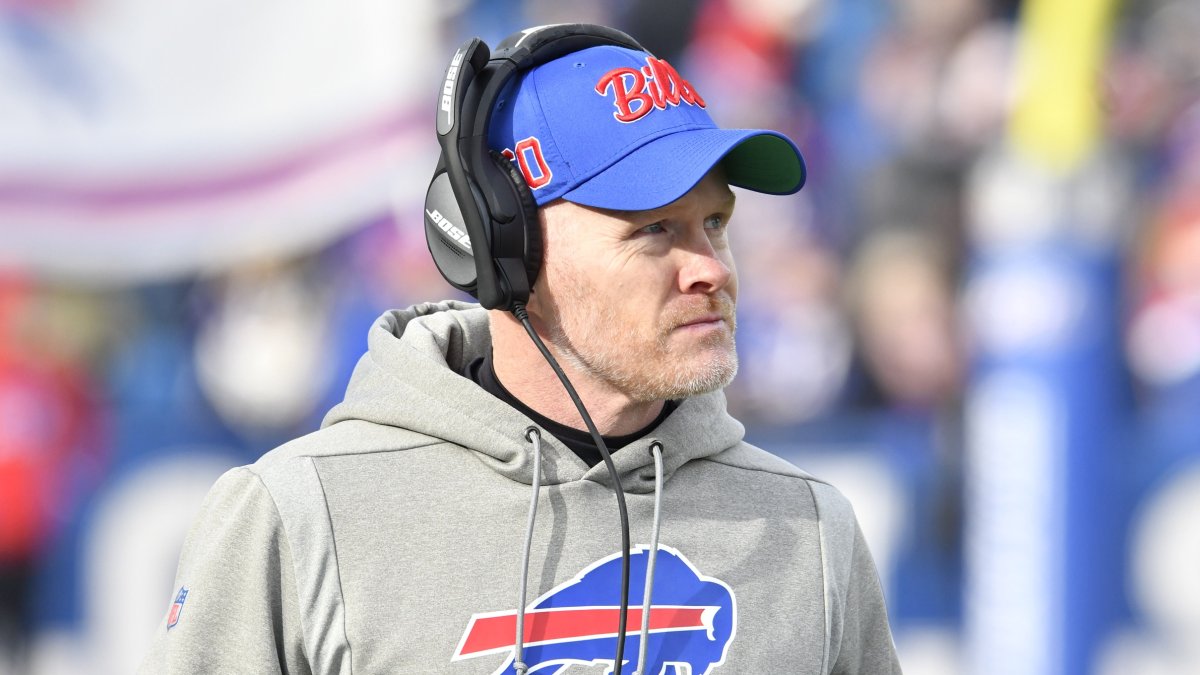The Buffalo Bills signed head coach Sean McDermott to a six-year contract extension Wednesday, securing the future of a coach who has led the team to its first two playoff appearances this millennium. The Bills are roughly co-favorites to win an AFC East that has been in the hands of the New England Patriots all but one season since 2003.
McDermott has been a very good head coach since he joined the Bills in 2017. Prior to that, he was the defensive coordinator of the Carolina Panthers, where he finished fifth (2016) and ninth (2015) in our defensive coaching metrics, which measures how well a play-caller does above the expectations set by situation and talent.
While he doesn’t call the plays in Buffalo, he and coordinator Leslie Frazier have continued to generate more value than the talent around them would suggest, with Frazier finishing the last three seasons as the 12th-, 13th- and ninth-best defensive play caller in 2019, 2018 and 2017, respectively. The Bills have won nine, six and 10 games in each of the previous three seasons, despite a roster that generated only 7.9, 4.5 and 7.8 wins as implied by the PFF WAR values of the players on their roster.
How does McDermott do this? Well, firstly (and this will be on pff.com tomorrow), he doesn’t leave many downs on the field. In 2019, he generated an extra 11 points on fourth-down decisions with four or fewer yards to go in the first three quarters of games, which was third-highest in the league. Josh Allen, for all of his limitations, led the NFL a season ago in fourth-down carries and converted on over 60% of them.
Speaking of Josh Allen, he is limited, especially throwing deep passes. So what did the Bills do? PFF's Kevin Cole documented how they built an offense to fail less with him a season ago. And while I still have significant concerns about him as a passer moving forward, the Bills acquired one of the league’s premier talents on the outside in Stefon Diggs this offseason to group with two very underrated players in John Brown and Cole Beasley. Worst case, they will fail quickly at the quarterback position, which is the second-best outcome you could ask for, frankly.
Finally, McDermott and company have built a defense the right way, from back to front. Coverage moves the needle more than pass rush, and the Bills with McDermott’s first draft pick in 2017 acquired one of the better young corners in the league in Tre’Davious White, grouping him with Jordan Poyer and Micah Hyde. In 2018, they drafted two cornerbacks, including Taron Johnson, who earned 0.13 WAR in over 500 snaps last year, before finally using a top pick on an interior defender in 2019 in Ed Oliver.
In McDermott’s three seasons in Buffalo, they’ve finished 18th, 18th and second in points allowed, while finishing 18th, second and third in net passing yards per attempt allowed. They've finished 25th, 10th and 19th in yards per carry allowed. They come into this season projected to have the eighth-most fantasy points as a defense, while they are only projected to have the 17th-most sacks. None of the top-20-paid edge or interior defensive linemen are Buffalo Bills, and Buffalo was first in the league in turning salary spent at the cornerback position into WAR in 2019.
While these extensions are generally a precursor to regression, which could very much be the case in Buffalo given their signal-caller, it is deserved in McDermott’s case. He has consistently gotten more out of the Buffalo Bills than they’ve had in terms of talent, and with one of the better-run organizations behind him moving forward, there could be a changing of the guard in the AFC East moving forward.



 © 2025 PFF - all rights reserved.
© 2025 PFF - all rights reserved.